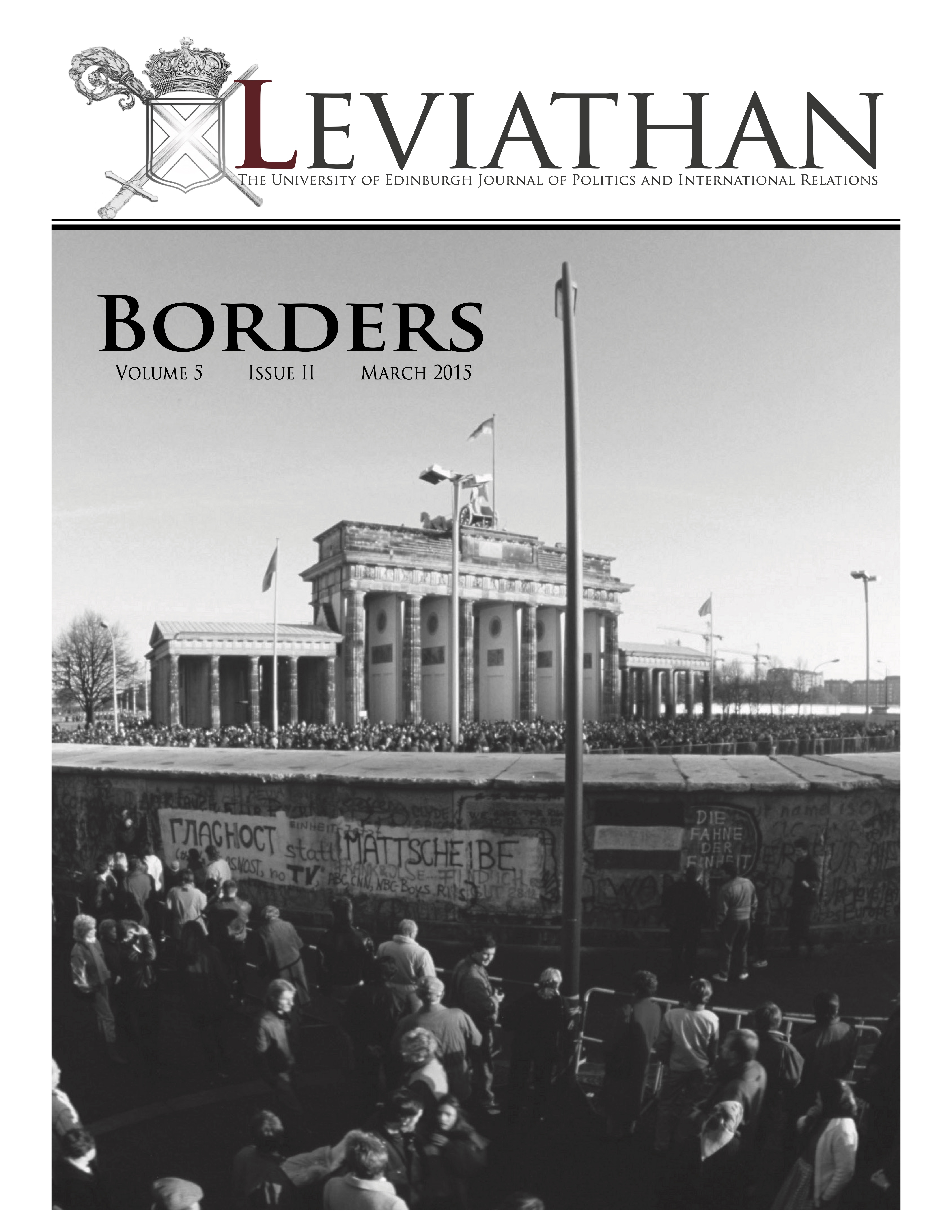
Welcome,
On behalf of the Leviathan journal, I am pleased to present to you our second instalment of the academic year. In this issue we discuss border conflicts, rules of international law, attitudes towards identity, the changing nature of sovereignty, and the limitations of diplomacy. In short, we explore the building and breaking of boundaries and conventions.
This is the first-ever issue of Leviathan to use a photograph rather than a painting on the front cover. We wanted this decision to emphasise our view of borders not just as abstract concepts or markers of sovereign territory but as starkly real and deeply personal stories of separation, struggle, and resilience. For example, the partition of India, analysed by Nishad Sanzagiri for this issue, must be understood not just in the context of colonial geopolitics, but also as a process that left millions of families displaced, mistreated, and torn apart. Likewise, as Will O’Sullivan points out, in order to meet the challenges of Kenya’s broken education system – an invisible border – we must understand the conditions and needs of the pupils as well as the political culture within the country. Throughout our discourse, we must never lose sight of the real people affected by international politics.
Several of the articles herein deal with the issue of building a Europe whole and free. Can this continent truly be united in transcending the borders of sovereignty, nationalism, and culture when so many divisions exist even within nations? In ‘Die Mauer im Kopf ’ contributor David Kelly describes the ghosts that still haunt Germany a quarter of a century after its reunification. The photograph on the front cover of this issue recalls the days leading up to reunification, featuring the Berlin Wall and the Brandenburg Gate in 1989. While the former was for many decades a physical mark of division, the latter has since become a symbol not just of German but of European openness, integration, and peace. In a reflection of the time period, one of the most prominent graffiti on the wall reads, in Russian letters, ‘glasnost’.
Contrary to popular belief, however, the fall of the Berlin Wall was not an inevitability, according to Mary Elise Sarotte’s recent book The Collapse. With much uncertainty and a still-powerful East German state, the fall of the wall was “accidental and contingent” in the way it came about. The Brandenburg Gate, located in no-man’s-land between east and west Berlin for much of the Cold War, was opened again. The fact that such formidable borders can simultaneously be so fragile strikes at the heart of the ambitions and insecurities of our shared humanity.
Continuing the practice we started in Leviathan’s ‘Power’ issue, we decided to highlight seven stories as special profile pieces in each region. These analytical items reflect some the most important global trends of today. Territorial disputes in the East China Sea are heating up, allowing China to flex its military and political muscle and potentially provoking the wrath of the United States. The spread of Ebola in West Africa should alert the international community to the importance of present and future cooperation against natural enemies that do not respect state borders. The war in Ukraine re- ignites an old debate concerning small states’ right to self-determination in the face of geopolitical bullying. Increased ISIS activity in Syria, Iraq, and several other countries demonstrates how unsuitable modern Middle Eastern borders fail to prevent terrorism and sectarian conflict. In the United States, the recent crisis involving unaccompanied Central American children on the border calls attention to the country’s broken homeland security system and the failing of the political class to recognise the human implications of bureaucratic rules. Finally, we investigate the tension between national sovereignty and financial markets in a globalising world. We hope that these profiles convey our understanding of borders through a compelling and captivating narrative.
I would like to extend some words of thanks. First, to our readers, whose interest and enthusiasm keep the staff motivated and make me believe in the future of this journal. It is the readers who take the published word and through their feedback turn it into a dialogue, making this endeavour worthy of the scholarly character to which it aspires. Further, we must recognise the work of our contributors as particularly commendable: it takes a special kind of resolve to voluntarily take on extracurricular academic writing. By projecting their views into the wider community, Leviathan hopes to ensure that its contributors’ toil is not in vain. Finally, the commitment of staff members who edit, produce, and fundraise for the journal cannot go unnoticed. These brilliant individuals have maintained their dynamism throughout the academic year, and working alongside them is a pleasure and a privilege.
Leviathan continues to benefit from the academic, financial, and administrative infrastructure provided to us by the Department of Politics and International Relations and the PIR Society. To them, too, we owe a debt of gratitude. Our bonds grow stronger with the passing of time, creating a community of colleagues and friends that I am confident will last for years to come.
I hope that you enjoy the talent and vision reflected in these pages.
Sincerely,
Marko John Supronyuk
Editor in Chief


